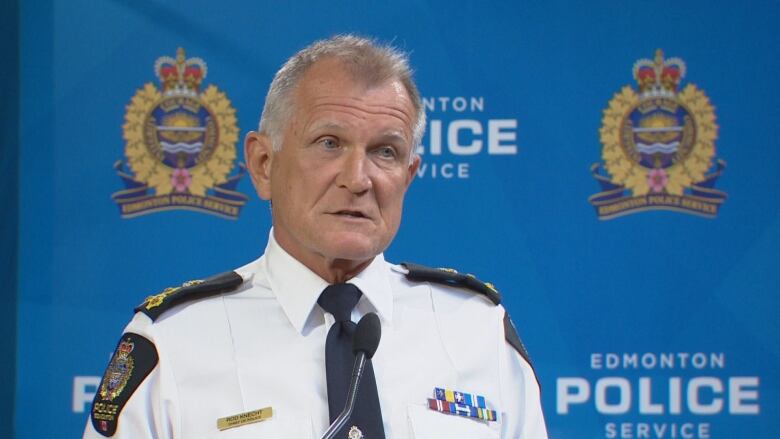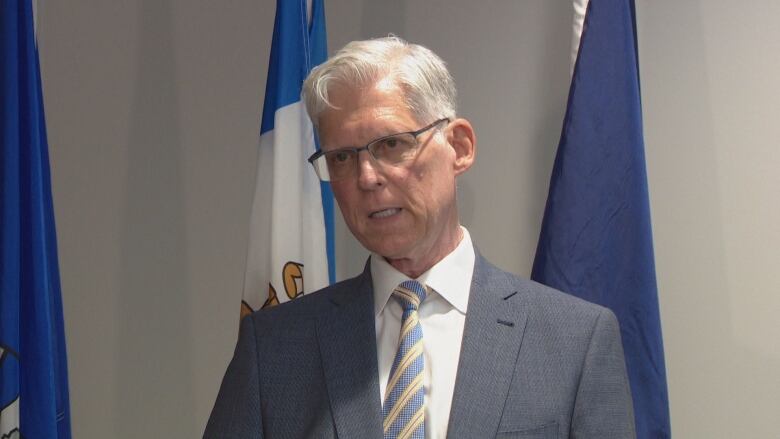Edmonton police to continue street checks, while adopting recommendations from new report
Report to Edmonton Police Commission does not conclude police conduct street checks based on race

The Edmonton Police Service will continue to conductstreet checks, but will implement several recommendations from an independent review of the practice.
Street checks came under scrutiny last year after information obtained by CBC News through a freedom of information request showed police disproportionately stopped black and Indigenous people. Edmonton police saystreet checks, also known as carding, play an important role in solving crimes and insist they are not racially motivated.
- Edmonton police commission to review police practice of street checks
- Indigenous women nearly 10 times more likely to be street checked by Edmonton police, new data shows
- Edmonton police defend street checks, reject allegations of racial profiling
The Edmonton Police Commission announced last summer it was appointing an independent third party to look into the practice. That report, released Wednesday, does not concludethat police areconducting street checks based on race.
"There is a considerable amount of confusion in the community about the purpose of street checks,"said CurtGriffiths, a professor at Simon Fraser University who led the review, which included input from the community and police officers.
The report found that only 16.5 per cent of the 27,125 street checks documented in 2017 were in compliance with EPS street-check guidelines. The remaining 83.5 per cent related to other police encounters, including loitering, transit fare checks, bylaw violations or traffic stops that were classified in a street-check database.
We're going to take it away and digest it and see how we can improve as an organization.- Rod Knecht, EPSpolice chief
The report said officers "profile situations, not persons" in doing street checks. It said police expressed frustration about accusations that officers were stopping people based on their skin colour.
The report's recommendations centred around better dialogue with community members and increasing diversity within the police force. It also recommended addressing privacy issues surrounding street checks, improving officer knowledge of the communities they serve, and improving officer training when it comes to interpersonal skills and dealing with people who may have experienced trauma.
Chief Rod Knecht said he was not surprised by the report's findings. He said several of the report's recommendations will be implemented, and he understands the importance of better communication with the community.
It's "paramount" that officers treat people with respect, he said.
"We're going to take [the report] away and digest it and see how we can improve as an organization," he said.
"We do have people that obviously feel they're being discriminated against, or that we have bias towardthem. And we have to work through that."
Knecht said 700 police officers have received trainingspecifically on street checks within the last six to nine months.

Black Lives Matter says race remains an issue
Last year, the advocacy group Black Lives Matter urged EPS to drop the practice of street checks altogether.
BLM chose not to be involved in the report, which Knecht said was disappointing.
But representative Bashir Mohamed saidthe group provided its own report and data to police "from day one."
The group did not want to take part in the rest of the process, he said, because two researchers including Griffiths who were selected to author the review were shown to be in conflict of interest because of prior work for the Canadian Police Association.
As for the report, Mohamed said it confirms much of what the group already knew, including that the community feels distrustful of street checks.
He said he is satisfied with the recommendations, but had hoped there would have been more clarity about whether EPS should keep the policy of street checking. Police need to take another look at how street checks are classified, he said, so they are not used as a "catch all" for a multitude of police encounters.
He said the group does not agree with the policestance that street checks are necessary for investigative measures and missing persons cases. He also criticizedthe report's inability to prove a correlation between street checks and racial profiling.
He said the data shows otherwise.
"We got three independent sources to verify our data to show this disproportionately impacted black and Indigenous people," he said.
"At the end of the day, there is that racial impact."












_(720p).jpg)


 OFFICIAL HD MUSIC VIDEO.jpg)
.jpg)



























































































